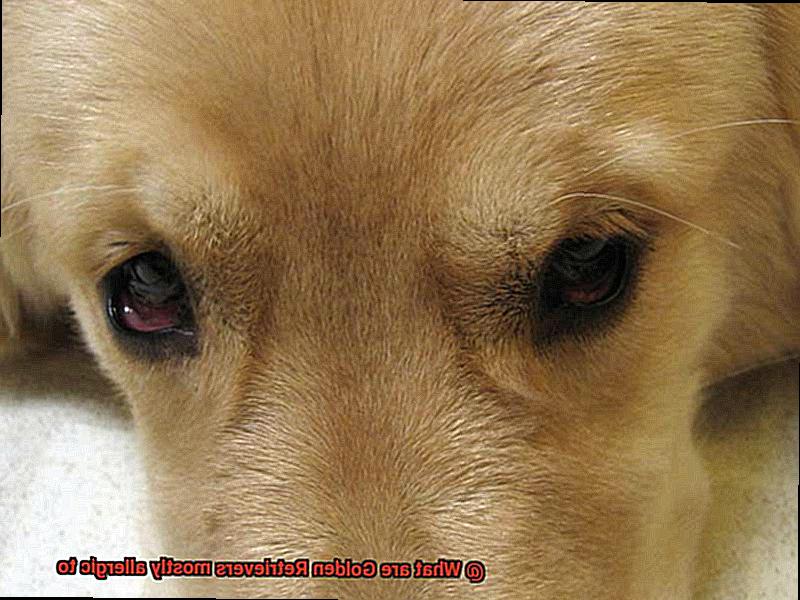As a Golden Retriever enthusiast, you undoubtedly want the best for your furry companion. But what if they start exhibiting symptoms of allergies? Panic may set in as you begin to ponder what could be causing their discomfort. Unlike us humans who are primarily allergic to dust and pollen, Golden Retrievers have a different list of allergy triggers.
Veterinarians have identified that Golden Retrievers are mainly allergic to food, pollen, dust, and fleas. These allergies can occur seasonally or persist throughout the year, resulting in skin irritation, itching, and hot spots. Common food allergens include chicken, beef, corn, wheat, and soy. When it comes to pollen, Golden Retrievers may be sensitive to tree and grass pollens. Dust mites, mold spores, and other environmental allergens can also trigger an allergic reaction that can be quite bothersome for your furry friend.
If left untreated, allergies can lead to chronic infections and secondary issues. Therefore it is crucial to identify the allergen and take necessary measures to control or eliminate it. In this blog post, we will delve deeper into each of these common allergy triggers that affect Golden Retrievers the most. We’ll discuss their symptoms and explore preventive measures you can take to keep your beloved Goldie free from allergies.

What are Golden Retrievers Allergic to?
Contents
Golden Retrievers are one of the most popular dog breeds in the US, loved for their friendly and loyal nature. However, just like any other breed, they are also prone to allergies. In fact, up to 10% of Golden Retrievers suffer from some form of allergy, making it one of the most common health issues they face.
So, what are these allergies caused by? The American Kennel Club (AKC) notes that Golden Retrievers can be allergic to a variety of factors, including food, environmental allergens, and flea bites.
Food Allergies in Golden Retrievers
It’s crucial to know the symptoms and treatment options to ensure your furry friend stays healthy and happy.
If you suspect your Golden Retriever has a food allergy, it’s important to understand that specific ingredients in their diet can trigger an immune system reaction. The most common allergens for Golden Retrievers include chicken, beef, dairy, wheat, soy, and corn. If your dog is allergic to any of these ingredients, it can lead to inflammation and discomfort.
Symptoms of food allergies in Golden Retrievers vary from dog to dog. Some may experience skin irritations like itching, redness, hives, or even hair loss. Others may have digestive issues such as diarrhea, vomiting, or gas. In severe cases, food allergies can even lead to anaphylaxis, a life-threatening condition that requires immediate medical attention.
If you suspect your Golden Retriever has a food allergy, don’t hesitate to consult your veterinarian immediately. Your vet will perform diagnostic tests to determine the allergen and recommend a suitable diet that avoids the offending ingredient. It’s crucial to follow your vet’s recommendations strictly and avoid all foods that contain the allergen.
Environmental Allergens
Environmental allergens are found both indoors and outdoors, and they are present year-round. Let’s delve into the world of environmental allergens and explore the symptoms that Golden Retrievers may experience.
Pollen from trees, grasses, and weeds is a common culprit of environmental allergies in Golden Retrievers. During spring and fall months, these allergens are rampant in the air, causing your dog to suffer from sneezing, itching, and watery eyes. Dogs may even experience respiratory distress or difficulty breathing in severe cases.
Dust mites are another pesky environmental allergen that affects Golden Retrievers. These microscopic insects thrive in household dust and can cause allergic reactions when ingested or inhaled. Symptoms of dust mite allergies in dogs include itching, redness, and inflammation of the skin.
Molds and mildew are also prevalent environmental allergens that can affect Golden Retrievers. These fungi thrive in damp environments and can be found both indoors and outdoors. When dogs come into contact with molds or mildew spores, they may experience symptoms such as itching, redness, and inflammation of the skin.
You need to take proactive steps to minimize your dog’s exposure to these allergens. Keeping your home tidy and mold-free can help prevent allergic reactions caused by dust mites and molds. Avoiding areas with high pollen counts during certain times of the year can also significantly reduce your dog’s exposure to pollen from trees, grasses, and weeds.
If your dog exhibits symptoms of an allergic reaction to environmental allergens, don’t hesitate to seek veterinary care right away. Your veterinarian may perform diagnostic tests to determine the specific allergen causing the reaction and recommend a suitable treatment plan.
Flea Allergies
One common issue that can cause discomfort for these lovable pups is flea allergies.
Fleas are tiny insects that feed on animal blood and inject their saliva into the skin. For some dogs, including Golden Retrievers, this saliva can trigger an allergic reaction. Even a single flea bite can cause intense itching, irritation, and other symptoms.
If you suspect your Golden Retriever has flea allergies, it’s essential to take action. Symptoms may include excessive scratching, biting or licking at the skin, redness, inflammation, and hair loss. Left untreated, these symptoms can lead to more severe health issues.
Prevention is key when it comes to flea allergies. Regular grooming and frequent baths with flea shampoo can help keep fleas at bay. Using flea repellents can provide added protection, while vacuuming carpets, furniture, and bedding regularly can remove any fleas or eggs present in your home.
If your Golden Retriever is already suffering from flea allergies, don’t worry! Your veterinarian can help. They may recommend antihistamines or corticosteroids to relieve itching and inflammation. In severe cases, immunotherapy or allergy shots may be necessary to desensitize your pet’s immune system to flea saliva.
Medication Allergies
Just like humans, dogs can have allergic reactions to certain medications, ranging from mild to severe. If left untreated, it can lead to life-threatening situations. As an expert on medication allergies in Golden Retrievers, I want to share some valuable information with you.
When a Golden Retriever ingests a medication that triggers an allergy, their immune system reacts by producing histamines. These histamines cause a variety of symptoms such as itching, hives, swelling, or difficulty breathing. It is crucial to seek veterinary care immediately if you suspect that your Golden Retriever is having an allergic reaction to medication.
The most common medications that can trigger allergies in Golden Retrievers include antibiotics like penicillin and sulfa drugs, non-steroidal anti-inflammatory drugs (NSAIDs) like aspirin or ibuprofen, and anti-anxiety medications like Xanax or Valium. It is essential to keep an eye on your furry friend’s medication intake and consult with your veterinarian before administering any medication.
To diagnose a medication allergy in a Golden Retriever, the veterinarian will perform a thorough physical examination and may order blood tests or skin tests to determine the exact cause of the allergy.
Once the cause of the allergy has been identified, the veterinarian may prescribe alternative medications or provide supportive care to alleviate the symptoms. In some severe cases, hospitalization may be necessary for observation and treatment.
Contact Allergens
These allergens can range from grass and pollen to flea saliva, certain grooming products, and household cleaning products.
Flea saliva is a common contact allergen for Golden Retrievers and can cause an itchy rash that can lead to secondary infections if left untreated. To prevent future infestations, it’s essential to not only treat fleas on your dog but also treat your home and yard for fleas. Regular use of flea preventative medication is also recommended to keep these pesky parasites at bay.
When it comes to grooming products, it’s crucial to read the labels and avoid any that contain ingredients that could trigger an allergic reaction in your dog. Some Golden Retrievers may be sensitive to certain types of shampoos or grooming sprays, causing excessive itching and scratching. Opting for products formulated for sensitive skin or hypoallergenic options can help prevent any potential reactions.
Household cleaning products can also pose a risk for contact allergies in Golden Retrievers. If you notice your dog having a reaction after coming into contact with a particular cleaning product, consider switching to a different brand or using natural cleaning products instead.
It’s important to keep in mind that not all contact allergies are immediately noticeable. Some dogs may develop an allergy over time after repeated exposure to a particular substance.
If you notice your furry friend excessively scratching or licking themselves, consult with your vet to determine the cause and appropriate treatment.
Conclusion
To wrap up, Golden Retrievers can be allergic to a range of factors, including food, environmental allergens, flea bites, medication, and contact allergens. As a devoted pet parent, it’s important to stay vigilant and seek veterinary care immediately if you suspect an allergic reaction.
Food allergies are common in Golden Retrievers and can stem from ingredients like chicken, beef, dairy products, wheat, soy, or corn. Environmental allergens like pollen or dust mites can cause respiratory problems and skin irritations. Even pesky fleas can trigger an allergic reaction that leads to excessive scratching and discomfort.
To minimize your pup’s exposure to these allergens, keep your home clean and mold-free. Avoid areas with high pollen counts during peak seasons and use flea repellents regularly. Grooming with flea shampoo is also essential.
Moreover, medication allergies can result in mild to severe reactions requiring prompt medical attention. Contact allergens found in grooming or cleaning products may pose a risk too.
In conclusion, identifying the root cause of the allergy is key for effective treatment.




